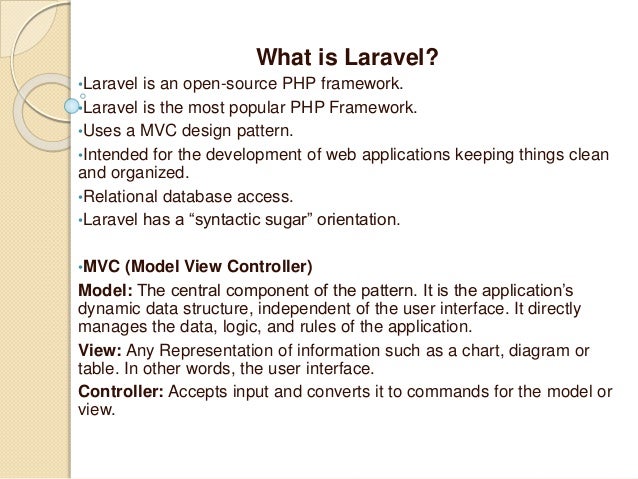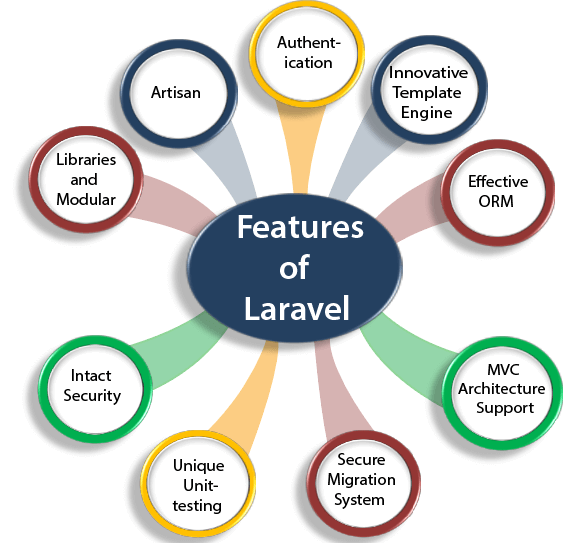What is Laravel?
Laravel is an open-source PHP web framework that follows the model-view-controller (MVC) architectural pattern. It was created by Taylor Otwell in 2011 and has since gained immense popularity in the PHP community for its elegant syntax, developer-friendly approach, and robust features.
#
Key Features of Laravel:
1. MVC Architecture: Laravel promotes the separation of concerns within an application by organizing code into models, views, and controllers, making it easier to manage and maintain the codebase.
2. Eloquent ORM: Laravel provides a powerful ORM (Object-Relational Mapping) called Eloquent, which simplifies database operations by allowing developers to work with database tables using PHP syntax instead of SQL queries.
3. Artisan Console: Laravel comes with a command-line tool called Artisan, which allows developers to perform repetitive tasks like database migrations, seeding, generating boilerplate code, and more with just a few simple commands.
4. Blade Templating Engine: Laravel’s Blade templating engine offers a simple yet powerful way to create dynamic and reusable views, making the process of designing and building user interfaces more efficient.
5. Authentication and Authorization: Laravel provides built-in support for user authentication and authorization, including easy-to-use methods for user registration, login, password reset, and role-based access control.
6. Testing Support: Laravel encourages writing automated tests for applications by providing convenient methods for testing routes, controllers, models, and views, ensuring the reliability and stability of the codebase.
7. Middleware: Middleware in Laravel allows developers to filter HTTP requests entering the application, making it easy to add layers of security, handle sessions, and perform other tasks before the request reaches the application logic.
8. RESTful Routing: Laravel simplifies the process of defining routes for RESTful APIs by providing a clean and intuitive way to map HTTP verbs to controller actions, making it easier to build scalable and efficient APIs.
In summary, Laravel is a modern PHP framework that offers a wide range of features and tools to help developers build robust, scalable, and secure web applications with ease. Its rich ecosystem, active community, and comprehensive documentation make it a top choice for PHP developers worldwide.

Features of Laravel:
1. Eloquent ORM: Laravel comes with an elegant and expressive ActiveRecord implementation called Eloquent ORM. It allows developers to work with database records using a simple and intuitive syntax, making database interactions seamless and efficient.
2. MVC Architecture: Laravel follows the Model-View-Controller (MVC) design pattern, which separates the application logic, data, and presentation layers. This modular approach promotes code organization, maintainability, and reusability, making it easier to manage complex web applications.
3. Blade Templating Engine: Laravel includes the Blade templating engine, a lightweight yet powerful tool for designing dynamic and reusable views. Blade templates support inheritance, sections, and composers, making it easy to create layouts and share data across multiple views.
4. Artisan Console: Laravel provides a command-line interface called Artisan, which offers a set of built-in commands to streamline development tasks. Developers can use Artisan to generate boilerplate code, run database migrations, seed databases, and perform various other tasks to speed up the development process.
5. Authentication and Authorization: Laravel simplifies user authentication and authorization with pre-built components and features. Developers can quickly set up authentication systems, define access controls, and manage user roles and permissions, ensuring secure and user-friendly login functionalities.
6. Routing and Middleware: Laravel’s routing system allows developers to define application routes using a clean and expressive syntax. Middleware can be used to filter and modify HTTP requests entering the application, enabling developers to implement custom logic for authentication, logging, and other tasks.
7. Testing Support: Laravel includes support for testing with PHPUnit out of the box, making it easy to write and run tests for applications. Developers can write unit tests, feature tests, and integration tests to ensure the quality and reliability of their codebase.
8. Database Migrations and Seeds: Laravel provides a migration system that allows developers to modify database schema and structure using PHP code rather than SQL statements. Database seeds enable developers to populate database tables with sample data, facilitating the setup of test environments and demo applications.
9. Task Scheduling: Laravel’s task scheduler makes it easy to schedule recurring tasks within the application. Developers can define commands to run at specific intervals, set up cron jobs, and automate routine tasks, such as sending reminder emails or cleaning up temporary files.
10. Error Handling and Logging: Laravel offers robust error handling mechanisms and logging features to help developers debug and troubleshoot applications effectively. Developers can easily configure logging settings, handle exceptions gracefully, and monitor application performance using built-in tools and third-party services.
